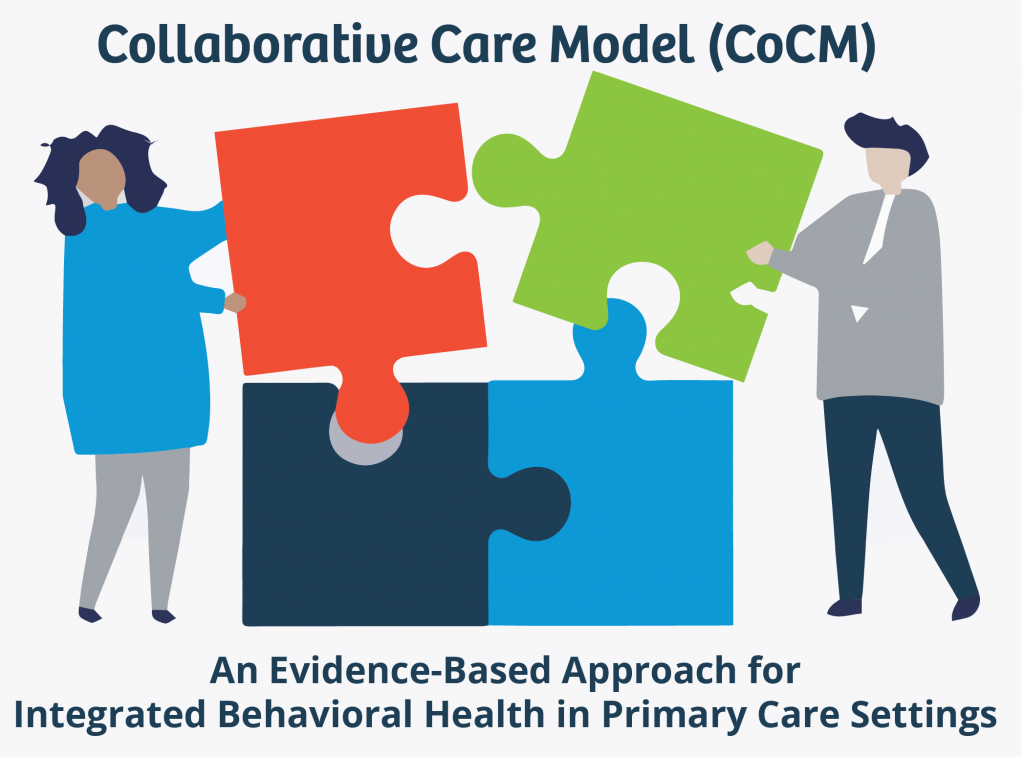Collaborative Care Model (CoCM)

What is the Collaborative Care Model (CoCM)?
The Collaborative Care Model (CoCM) provides patients with integrated medical and behavioral health care in a primary care setting. Benefits include a financially sustainable model, better patient outcomes, improved patient and provider satisfaction, and reduction in health care costs and disparities. Medicare, Medicaid and most commercial payors reimburse using monthly time-based billing codes.
The CoCM involves a team-based, interdisciplinary approach to provide screenings and brief interventions for patients mostly with mild-moderate depression, anxiety and pediatric attention deficit disorder. The team includes a primary care provider (PCP) who leads the team, behavioral health care manager (BHCM) to assist with coordination, screening and management, and a psychiatric consultant to provide expertise to the PCP and BHCM. Key components include a comprehensive screening, diagnosis and treatment; care coordination to ensure seamless care; regular monitoring and treatment using validated clinical rating scales and data registry; and systematic psychiatric caseload reviews and consultation available for patients who do not show improvement under the model.
Practices can deploy either an onsite or virtual telehealth model. The BHCM can be full-time, part-time or shared, employed or contracted, onsite or virtual. Full-time BCHMs typically have a patient panel of 60-80 patients. A contracted or employed Psychiatric Consultant normally works 2-4 hours per week, on-site or virtual with protected time to review caseloads with the BHCM and consult with the PCP. The Psychiatric Consultant typically does not see the patient or prescribe medications. PCPs have protected time to periodically communicate and participate in the care coordination. A shared data registry tracks scores and treatment for enrolled patients with mild/moderate depression, anxiety, and/or pediatric ADHD using systematic screening protocols.
View our collection of video testimonials to learn more about CoCM and how it’s being implemented in practices statewide!
What is NC AHEC’s role with the Collaborative Care Model (CoCM)?
The North Carolina Department of Health and Human Services, Division of Health Benefits (DHB) partners with NC AHEC to provide educational and practice-based support to primary care practices interested in implementing the Collaborative Care Model.
• Practice Support Coaching: Coaching includes help with best practices, workflows, proforma analysis, billing/coding, caseload tracker implementation, capacity building funds, psychiatric consultant resources, telehealth and continuing education programs. To access practice support or any of the services below, contact us at practicesupport@ncahec.net.
• Capacity building funds via Community Care of NC (CCNC) and NC DHHS. Read more about CoCM capacity building funds here.
• Caseload Tracker or Data Registry at No Cost: CCNC provides an enhanced version of the AIMS Caseload Tracker registry for qualifying practices at no cost for a limited time.. https://www.communitycarenc.org/ccnc-aims-caseload-tracker
Collaborative Care Model Trainings
Online Group Modules
NC AHEC offers on-demand training programs at no cost with educational credits. Click on the button below to register for Group Modules. NOTE: Group 1 is for introductory training and required for CoCM capacity building funds.
Learning Collaboratives
Monthly learning collaboratives are designed for providers and practice staff actively engaged with NC AHEC coaches to implement the CoCM within their practices. Click on the button below to register for the 2026 CoCM Learning Collaboratives.
3rd Annual CoCM Behavioral Health Care Manager Summit
Thursday, April 30, 2026
The Conference Center at GTCC | Colfax, NC
This year’s summit will provide an update on CoCM in North Carolina, explore crisis response for trauma within the CoCM framework, and cover essential topics such as CoCM Billing/Coding/QI, CoCM & specialized populations, practical tips and tricks of CoCM, behavior activation (adult), and motivational interviewing. These sessions are designed to enhance the unique clinical skills required for BHCMs practicing in primary care and other healthcare settings.
This event is designed for an interprofessional audience, including primary care physicians, psychiatric consultants, residents, and advanced degree health professionals (such as CoCM BHCMs). We also welcome behavioral health professionals, including graduate students, and practice leadership interested in implementing or expanding the Collaborative Care Model within their primary care settings.
Meet Our Team
Our Partners
We all share the responsibility of ensuring quality health care is delivered to the citizens of North Carolina. Collaboration is key to achieving this goal. We appreciate our partners for their support of NC AHEC Practice Support.
